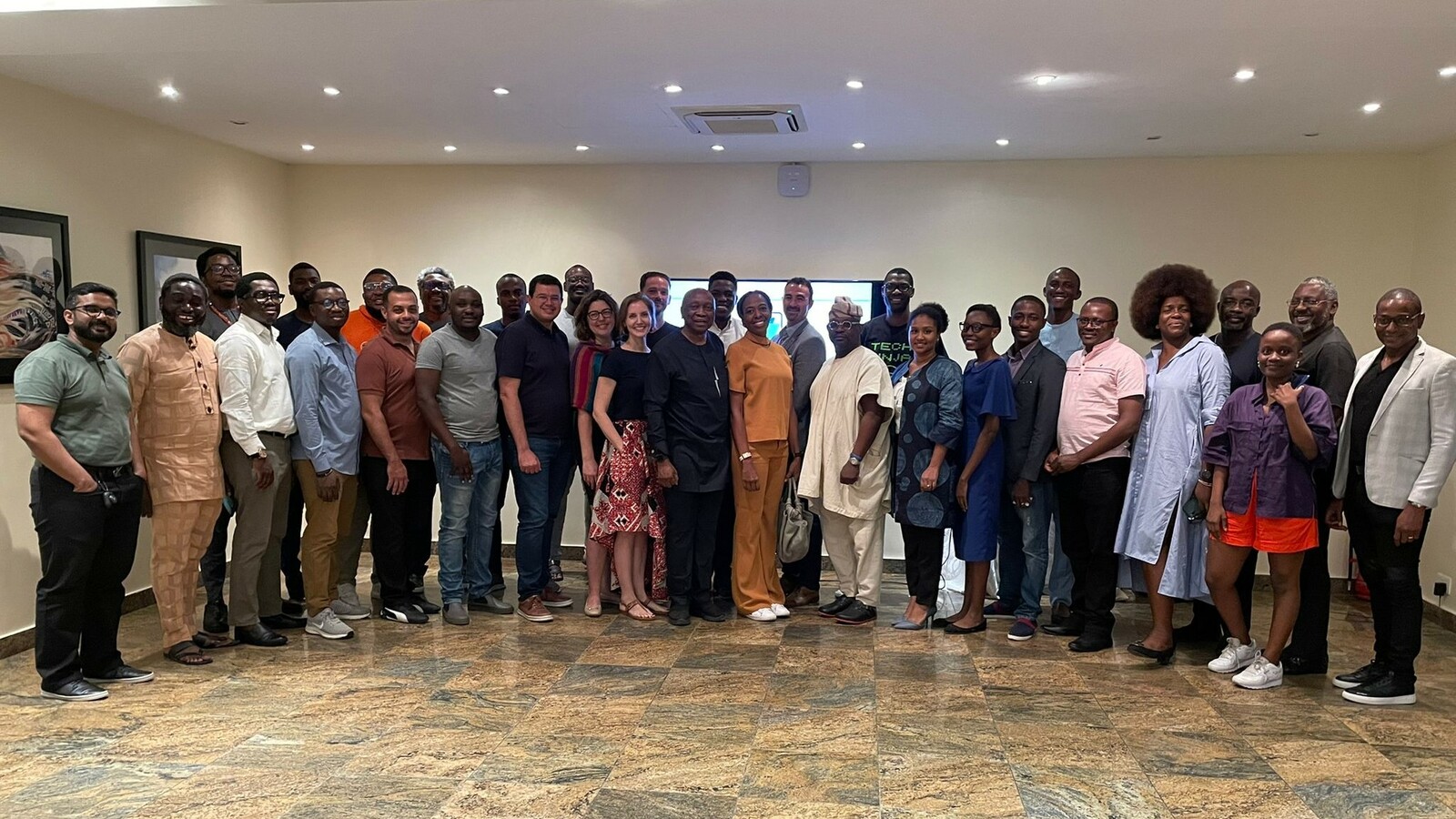Goodbye, Lagos

Goodbye, Lagos — it’s been phenomenal. In a few hours, we’ll be heading back on a six-hour flight to Omm El Donia, with the adrenaline of the past four days slowly dialing down, giving us time to process what we have experienced — and add all those new connections to our LinkedIn profiles. It’s been a whirlwind of meetings, chapmans (refresher: the local go-to drink), beautiful people, spicy food, inspiring stories, lessons learned, and relationships built.
If there was one word to describe this trip, it would be vibrant. The energy of the local startup scene is contagious, and we now understand why many stakeholders told us that Nigerians are inherently entrepreneurial.
On our last day, our dedicated host Tomi Davies put together a reception for us with angel investors and local startups (pictured above). And again, we’ve met some inspiring people. One of them is Yemi Keri (LinkedIn), cofounder of The Rising Tide. Keri was able to pool together 87 investors to build an angel investors network — and here’s the interesting part: they’re all women. So far, they’ve invested USD 1.8 mn in 28 startups. We also met startup celebrity Iyinoluwa Aboyeji (aka E — LinkedIn), who was a cofounder of two of Nigeria’s poster children: fintech Flutterwave and job placement network Andela. Today, he is the founder and GP of the Future Africa fund.
Lagos and Cairo seem to be very much “same, same, but different” — at least that is how our trip companions feel. “The energy levels have been really, really high; people have been super nice and expressive. That feels very much like home,” CEO of the Cairo Angels Syndicate Fund (CASF) Aly Shalakany — and trip organizer — said. The streets never sleep, and the people we’ve met in the tech space are a reflection of that, he added. Adham Azzam, CEO and cofounder of fintech startup Balad, agreed, adding that “things here move very fast.”
…which led some of us wonder whether expanding into Nigeria may make more sense for Egyptian startups than expanding into the GCC. Given similar market dynamics, the expansion of Egyptian startups into Nigeria and Africa in general may be more successful than moving to the East, CEO and founder of Nawaah Scientific Omar Shoukry tells us. Especially in the life sciences space, Shoukry believes that there is a greater need and opportunity in Nigeria than Dubai, for instance.
And fintech seems to be the biggest player in Nigeria at this point in time. “Every second billboard is that of a fintech company,” Azzam tells us.
We’ve also noticed that a lot of founders and investors were part of the Nigerian diaspora. Based on our conversations with local stakeholders, we’ve realized that a lot of the active players and entrepreneurs are Nigerians who had either lived abroad or studied in another country, and decided to come back to help move their country forward through either building a company or funding startups.
But building a company seems to be more challenging in Nigeria than Egypt, mainly due to problems in the traditional infrastructure. (Almost) every building in Lagos has a generator, which is operated at least 3-4 hours a day, due to frequent power cuts. Moreover, a lot of neighborhoods in Lagos don’t have access to water, which is why they dig boreholes accompanied by micro-desalination plants, locals tell us. That makes it a lot easier to build a company in Cairo than Lagos, Shalakany suggests.
What can we learn from Lagos? Definitely hustling. “The market in Nigeria is much more competitive [than Cairo], and a lot of the founders here know that they have a tough journey ahead,” Shalakany says. Since the volume of startup funding to Nigeria is crazy, competition is very high, which pushes for higher quality products and services — and pushes people to work harder.
And maybe that purely digital solutions are not necessarily … solutions, especially in the fintech space. “Here, every fintech company has a hybrid model,” Azzam says. Having a business model that combines on-ground activities and physical solutions, while also providing the digital solution allows for larger market penetration, he adds.
Lastly, there was one narrative that kept repeating itself: building Africa. Whether we were talking to entrepreneurs or investors, almost everyone was aligned on a continent-wide objective, as opposed to a country-focused one. Davies summed it up beautifully at yesterday’s reception, saying: “We are building Africa — profitably and impactfully.”
Big final thanks Davies and his team at TVC Labs: Mayowa and Segun Ojuri (along with their nine-month old son and his grandmother, who also accompanied us on our trips through Lagos). They allowed us meet the maximum number of people in such a limited time and made sure everything ran smoothly. They were even kind enough to welcome us at the airport with a WiFi modem so that we could tell our folks back home we’d landed safely.
Over the next weeks, we’ll be publishing in-depth analysis of the conversations we’ve had in our What’s Next vertical. And in case you’ve missed some our travel logs this week, catch up on them here: Enterprise is visiting Planet Startup — in Nigeria | Day one | Day two | Day three.
CORRECTION- In our coverage of day one in Lagos, we’ve mistakenly referred to Victoria Island as Virginia Island. The mistake has since been corrected on our website.